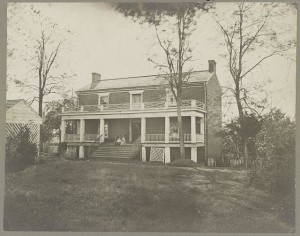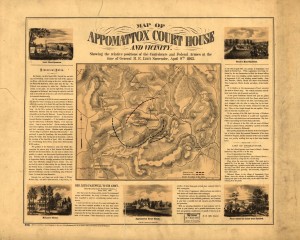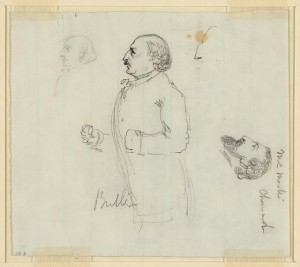
where General Grant was prudently kind (“McLean’s House, Appomattox, Va. Scene of Lee’s surrender” Library of Congress)
A publication in the Finger Lakes area of New York State pleaded for forgiveness and reconciliation for the returning rebels. From a Seneca County, New York newspaper in April 1865:
The Amnesty.
The terms extended to the Confederate officers and troops under Gen. Lee, is a complete amnesty in its terms, for political as well as military offenses. This does not suit some of the more blood-thirsty of the Republican leaders, and the Washington correspondent of the Tribune says “the bribe of unconditional forgiveness offered by Mr. Lincoln to the rebels has already established a split in the Republican party.” Beast Butler represents the disaffected of the abolition camp, and in a speech at Washington, on Monday night, this marplot advocated the most extreme and diabolical measures towards all who have been engaged in the rebellion. In view of Butler’s exploits at Big Bethel, Big Ditch and Fort Fisher, he ought to hide his head in very shame at his impotence in war. – Butler never exposed his precious carcass to rebel bullets, and it is far to presume that he never will. His only capacity seems to be for mischief and plunder. But he is the representative of the New England element of the abolition party, whose sentiments he uttered at Washington on Monday night, hence we may look for anything but harmony among the friends of the administration, in the closing up of this most unnatural strife. But Gen. Grant has taken the initiative step, and the President must sustain him if he hopes to bring about a permanent and lasting peace.
From The New-York Times April 11, 1865:
NEWS FROM WASHINGTON.; GEN. BUTLER ON RECONSTRUCTION. THE DAY OF JUBILEE. REBEL PRISONERS. SPEECH BY THE PRESIDENT.
Dispatches to the Associated Press.
WASHINGTON, Monday, April 10.
Among those who delivered speeches to-day was Maj.-Gen. BUTLER. His remarks were principally directed to the subject of the future disposition by the government of the participants in the rebellion. He recommended that all the leaders should be disfranchised and disqualified for holding any office under the government, but that the masses, including the negroes, should have the rights of citizenship. The address was loudly applauded, and at its conclusion the crowd dispersed.
Very little public business was transacted to-day, even the courts adjourned.
Within the past two weeks over twenty thousand rebel prisoners have been sent away from City Point, and a large number still remain there.
Several hundred persons gathered before the Executive mansion this afternoon at 5:30. Frequent calls were made for the President, who appeared merely to say: “If the company had assembled by appointment, some mistake had crept into their understanding. He had appeared before a larger audience than this one to-day, and he would repeat what he then said, namely, he supposed, owing to the great, good news, there would be some demonstration. He would prefer tomorrow evening, when he should be quite willing, and, he hoped, ready, to say something. He desired to be particular, because everything he said got into print. [Laughter.] Occupying the position he did, a mistake would produce harm, and, therefore, he wanted to be careful not to make a mistake [A VOICE — You have not made any yet.]
The President was greeted with cheers, and, after bidding the crowd good evening, retired.

“Map of Appomattox Court House and vicinity. Showing the relative positions of the Confederate and Federal Armies at the time of General R. E. Lee’s surrender, April 9th 1865. ” (Library of Congress, Geography and Map Division)
_________________________________________________
Par for the course, Secretary of War Stanton telegraphed General Dix in New York City 150 years ago today; but there was no indication of a trumped-up Union victory in battle. Today the dreaded and despised draft was officially history.


